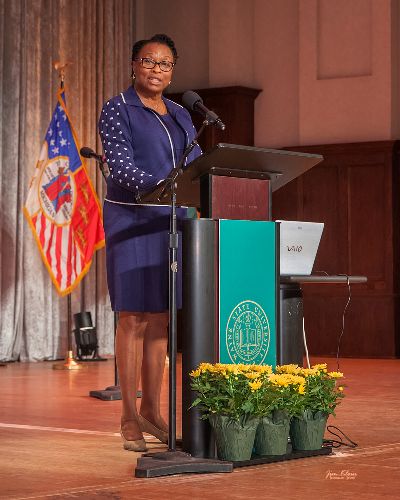Beyond the News is a feature that takes a closer look at a Wayne State news story by briefly interviewing a campus expert on the topic. Send your ideas for future Beyond the News topics to tedmontgomery@wayne.edu.
 Daphne Ntiri, professor of African American studies at Wayne State University and a leading expert in gender and adult education and literacy, has been invited to join the Centre for Gender Research at Uppsala University in Sweden as a visiting researcher this summer.
Daphne Ntiri, professor of African American studies at Wayne State University and a leading expert in gender and adult education and literacy, has been invited to join the Centre for Gender Research at Uppsala University in Sweden as a visiting researcher this summer.
Ntiri, who edited the book Literacy as Gendered Discourse: Engaging the Voices of Women in Global Societies, will join a team of more than 50 researchers with backgrounds in various disciplines, including the humanities, social sciences, medicine and natural sciences. The group will focus on the relationship between gender equality and literacy.
During her two-month appointment at Uppsala University, Ntiri hopes to gather information including census data and study the patterns and rate at which African women who have migrated to Sweden and other Scandinavian countries take advantage of literacy and educational opportunities.
We recently asked Professor Ntiri to tell us more about this research opportunity.
1. What makes Sweden an intriguing research destination?
Sweden has been a stellar example of women’s struggle for equality — they’ve been avant-garde in that respect. They were part of the early movement in the 1900s and have always been a very progressive society. When you go there, there are not the same limitations that you might find elsewhere. There are a lot of opportunities for everyone, and in many ways, it’s become a destination for those looking to improve themselves. Sweden was not an imperial power or colonial state in the late 1800s like Britain and France. When many of the African countries that had previously been colonized declared independence in the ’50s and ’60s, many people looked to the well-to-do Scandinavian countries as places of opportunity.
2. What role does immigration play in literacy? What role does gender play in literacy?
When people migrate, they often do so for the opportunity to advance themselves. Not everyone, though, takes advantage of those opportunities for any number of reasons. There was a time not that long ago — especially in Third World countries — when women just didn’t migrate on their own. They traveled as spouses, daughters and sisters. Some cultures, too, cling to very traditional ways of thinking that believe that denying education to girls protects them. The logic is that if you send a boy to school, he stays and helps the family and if you send a girl, she marries and leaves the family. [Ntiri’s book Literacy as Gendered Discourse brings more enlightenment to this subject.]
3. What does the transformative power of literacy look like in action?
Education is that singular opportunity to get where you’re going — it opens so many doors. There are several levels of literacy, including low literacy, functional illiteracy and total illiteracy. For those taking advantage of literacy opportunities, it’s redemptive and empowering. When people, particularly women, develop those skills, their expectations and aspirations change completely. People have all kinds of needs — maybe they want to count better so they’re not cheated, or they also want to be able to barter, or be more competent and competitive seamstresses. When people begin to taste the kind of success literacy brings, it’s a change. It’s a positive trend toward what every woman should be seeking in this global economy. In this globalized world, everyone, particularly women, should have access to these kinds of opportunities. Access is one of the most important aspects of literacy. Having advancement opportunities is just one step — from there, people need to be informed and aware before they can take action.